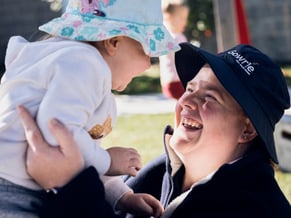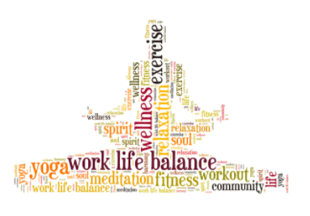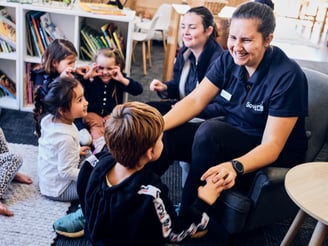By Alana Evans, Founder of Belong Be Become
Our role as educators reflects our desire to foster the wellbeing of children however, we must also believe that we are worth taking care of.
The health and wellbeing of early childhood educators holds great significance from a myriad of perspectives.
Over the past fifteen years of working in the early childhood sector, I have noticed that the most effective way to promote the wellbeing of the children in my care is to embody a strong sense of wellbeing within myself.
I believe that the wellbeing of educators is key to promoting high-quality outcomes for children, preventing burnout and upholding purpose and integrity as an early childhood professional.
High Quality Outcomes for Children
An article by Cumming (2016) says:
“a direct connection occurs between early childhood educators’ wellbeing and their capacity for providing high quality education and care”.
 From both study and observation, a large portion of learning for young children, manifests through imitation. When educators exhibit physical energy and stamina, emotional availability and professional enthusiasm, the children in their care have a greater opportunity to thrive. Children express their imitative tendencies through their play as they often ‘play out’ people, places and behaviours. What has been impressed in the child, is expressed through play.
From both study and observation, a large portion of learning for young children, manifests through imitation. When educators exhibit physical energy and stamina, emotional availability and professional enthusiasm, the children in their care have a greater opportunity to thrive. Children express their imitative tendencies through their play as they often ‘play out’ people, places and behaviours. What has been impressed in the child, is expressed through play.
Stephen Spitalny says that children learn and imitate the traits of their educators and that this influences their behavioural patterns. Tone of voice, physical gestures and quality of presence are reflections of our inner mood and influence the environment we inhabit. Children absorb their surroundings through all their senses so it is important to reflect on how we are contributing to their responses.
Some reflections on ways to promote your own physical wellbeing:
- Find a form of physical exercise that you enjoy – running or walking, team sport, yoga or pilates, dance.
- Eat according to your body’s composition – perhaps gain advice from a naturopath or nutritionist.
- Make sure to get enough sleep each night, between 6-9 hours.
- Reflect on how much energy you need and where you need to place more/less of it.
 Burnout
Burnout
If the wellbeing of educators is compromised, almost every aspect of their role cannot be fulfilled.
The early childhood sector has one of the highest turnover rates amongst other professions and this is due to a number of factors that include (but are not limited to), time pressures, managing children’s needs with personal needs, collaborating with parents, maintaining classroom practices and meeting policy requirements. Being an early childhood educator can be extremely challenging, overwhelming and exhausting. It is important to foster a collective valuing of wellbeing in your service by acknowledging and supporting the different wellbeing requirements of your fellow educators. This will create a stronger and more supportive team dynamic and ultimately, lessen or even prevent the chance of burning out.
Some educators that were interviewed as part of the Early Childhood Education and Care Wellbeing Project reported feeling “guilty” for taking a break! It is important that we encourage each other to take the time to honour our own wellbeing needs so that we have to energy to keep giving.
Some ideas for mental/emotional wellbeing:
- Prioritise a minimum of 10 minutes each day to meditate, reflect or just have quiet time.
- Engage in enjoyable leisure activities.
- Go for a stroll in nature.
- Spend time with friends and family who promote a sense of belonging for you.
Purpose and Passion
 When we are running on empty, we are less likely to feel inspired and work from our highest potential. As educators, we are eager to see the children before us flourish and develop into competent human beings, but we have to lead by example!
When we are running on empty, we are less likely to feel inspired and work from our highest potential. As educators, we are eager to see the children before us flourish and develop into competent human beings, but we have to lead by example!
When we prioritise our wellbeing, we are able to think, respond and create more efficiently. Our state of wellbeing affects the way we interact with others, the quality of programming and planning and the collective energy within the service.
It is important to note that there is no such thing as being in a perfect state of wellbeing - life changes from day to day and many external things are beyond our control.
What's important is that we have a toolkit of wellbeing practices to draw upon that support us in supporting ourselves. It is equally important that we support our children, families and colleagues along their wellbeing journey too.
Practices for staying professionally inspired:
- Engage in regular professional development.
- Reflect on what you love about being an educator (and share this with others).
- Prioritise building on the strengths you already have.
Since taking a genuine interest in my own wellbeing and understanding the many aspects that encompass it, I have noticed significant changes in my observations of and approaches to the children in my care. My relationships with them have become much more meaningful.
As educators, we are privileged to be in a position that influences the future of humanity. If we value and commit to daily practices that foster our physical, emotional and professional wellbeing, we will notice a difference in the potential of the children in our care and the future that awaits us.
My favourite quote by Rudolf Steiner sums it up perfectly,
“You will not be good teachers if you only focus on what you do and not upon who you are”
We all know that the first seven years of a child’s life is the most crucial in shaping their values and identity. Remember that children learn by imitating what they experience through their senses. They deserve to be cared for by people with integrity and warmth, who are worthy of imitation.
Educators my message to you is: ‘Believe you are worth taking care of, because, you are’
About the Author
 Alana Evans - the founder of Belong Be Become is an early childhood teacher and an advocate for educator well-being. Having worked in the early childhood profession for over a decade, Alana has come to recognise the inherent value of self-development in her role as an educator. After many years of studying and practicing Yoga, inspiration from the Waldorf philosophy and hands on experience in early childhood settings, Alana has learnt how to incorporate effective ways to strengthen wellbeing and personal development.
Alana Evans - the founder of Belong Be Become is an early childhood teacher and an advocate for educator well-being. Having worked in the early childhood profession for over a decade, Alana has come to recognise the inherent value of self-development in her role as an educator. After many years of studying and practicing Yoga, inspiration from the Waldorf philosophy and hands on experience in early childhood settings, Alana has learnt how to incorporate effective ways to strengthen wellbeing and personal development.
Alana says: “I am passionate about sharing wellbeing practices with educators to empower them to uphold their roles with passion and integrity”




